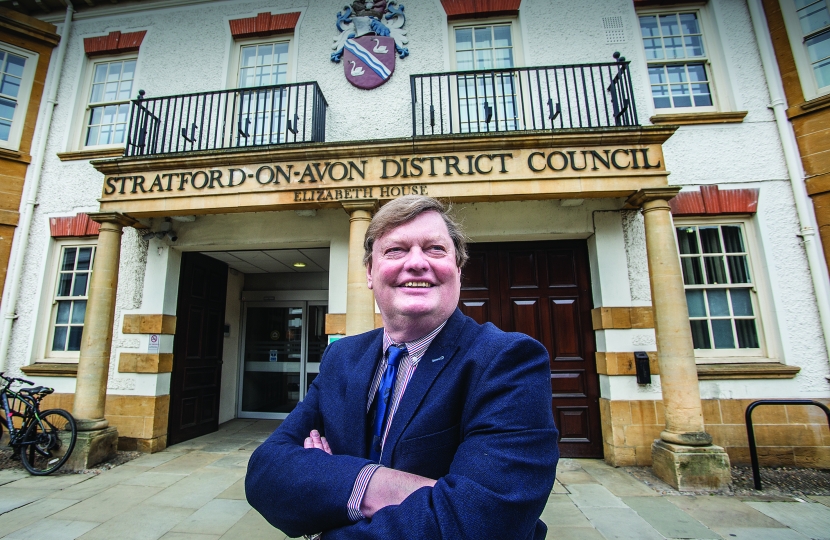
It was extremely disappointing that we did not succeed in our bid for levelling up fund money for the World Shakespeare Centre. Indeed, neither bid for Stratford was successful. As I write this we have not yet had feedback so that we can understand the reasons. It would be unfortunate if the underlying reason is that, because we are seen as a prosperous area, we are somehow less deserving, despite the quality and positive benefits of our proposals.
It is interesting, therefore, that the picture now emanating from the Department for Levelling Up has shifted from wholesale changes to the structure of local government to an increased focus on levelling up and economic development. This is perhaps unsurprising for two reasons. The first is that the initial attempts at local government reorganisation do not appear to have gone down well in the areas affected. Indeed, Cumbria has commenced a judicial review of the decision. The second reason is that the Government may have noticed our abysmal economic performance since the financial crisis and that the forecasts beyond 2022 show a continuation of that performance. I think this shift in emphasis is extremely welcome. I understand that there will now be a more pragmatic approach to any proposals for local government reorganisation. The merger we are proposing with Warwick District Council will fit squarely into that category.
As a relatively small organisation, however, we cannot have substantial direct effect on our own on the nation’s rate of economic growth. That said, we take the issue very seriously and do everything we can to encourage growth locally. A couple of weeks ago I was invited to Ironbridge to see the demonstrator of the Very Light Rail Project. This uses leading edge technologies that make rail solutions much more affordable. As the name Very Light Rail suggests, it is lighter than current trains so the tracks it runs on need less robust foundations. The University of Warwick is one of the consortium members. Although I had to travel to Ironbridge to see the demonstrator in action, it was actually built at Long Marston. Revolution VLR, the firm developing it, is based in Stratford upon Avon. Also being developed at Long Marston is a prototype hydrogen train which we saw demonstrated before the Covid-19 pandemic. Both of these innovative initiatives will create “green” jobs and will provide more sustainable solutions for rail travel.
Where the very light rail solution may be very useful locally is in providing a cost effective solution for a rail link between Long Marston and Honeybourne. A heavy rail solution is simply uneconomic. This potential will be explored in the South Warwickshire Plan currently being developed. It will, of course, need funding; however, one of the advantages of thinking strategically is that we can begin to build a case for innovative solutions. Thinking ahead can pay dividends.
We also meet every month with the CWLEP Growth Hub’s contact for Stratford District. This meeting keeps us in touch with the issues facing businesses in the District. Indeed, for the latest grant funding we have available, we are using the Growth Hub to help us allocate funding to where it will have the most beneficial impact. There is no point trying to reinvent the wheel when skills and knowledge already exist elsewhere.
To help economic development and growth in the District we have to be in touch with what is happening on the ground. We also have to demonstrate that we are “open for business”. This is why, as a team we put time and effort into visiting businesses and listening to their concerns. I get the feeling that sometimes businesses are surprised that we do this, but it is important. We have to represent all stakeholders in the District. It would be good to have funds to do much more, and, if economic development is higher on the Governments agenda this may happen. I am, however, not holding my breath.
Understanding what is happening on the ground and being “open for business” are absolutely vital if one is aiming to make a difference. One of the big potential benefits of our proposed merger with Warwick District is that it will give us a stronger voice and greater influence so we should be able to do more in this area.
There is absolutely no doubt that these are challenging times. Brexit has had a greater negative impact than I think many people expected. When that is coupled with the impact of Covid it is not surprising that many businesses have been struggling. From everything I read and hear the supply chain disruptions will last most, if not all, of 2022. Inflation continues to rise and we will, almost certainly see interest rates increase. This situation has been called “The Perfect Storm” by some. I would concur with that description. At times like these encouraging new, growth industries is vital. Even without funds we can show encouragement and support.
My colleague, Matt Jennings, recently organised a jobs fair at the Stratford Playhouse where over 50 organisations from all over the District exhibited. This event was attended by over 200 people and attracted lots of positive media coverage, both nationally and internationally (BBC Overseas radio did a piece for the US market!). It got the message out that, not only is Stratford District open for business and welcoming back tourists, it is also prepared to look at innovative ways to make a difference. During one of a number of interviews, Matt was asked what would need to happen for the jobs fair to be considered a success? His answer was that, if it helped steer one person in a positive career direction, it would have been worthwhile. Matt was contacted by one of the exhibitors the following day to inform him that he had made three job offers that had been accepted, all to individuals who had been long term unemployed.
More than 11% of the exhibitors had been able to recruit staff as a result of attending the jobs fair and 33% were still following up leads. This was an excellent initiative which we will look to expand next year.
These are the kinds of initiative we can take. It demonstrates that we are prepared to be proactive. It sends a clear signal that we are genuinely trying to make a difference for people. It also reflects our view that jobs are really important to people and to society.

